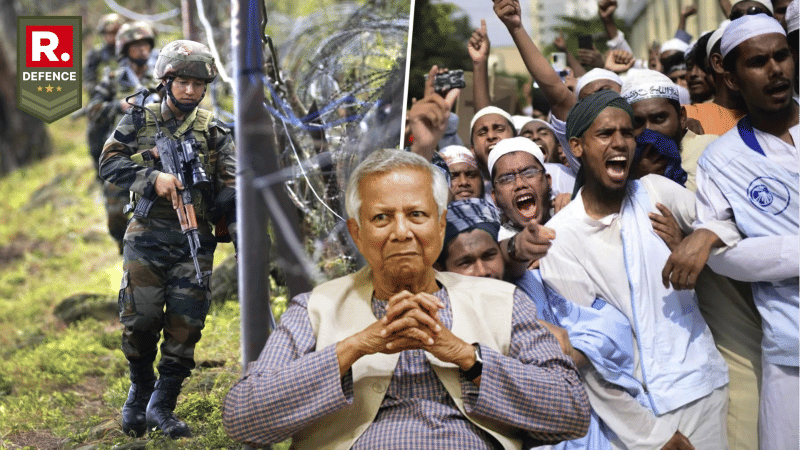Published 18:07 IST, December 24th 2024
Jammu and Kashmir Terror Networks Thrive Under Yunus Government's Watch in Bangladesh
Under interim leader Muhammad Yunus, Bangladesh is accused of fostering a climate where terror outfits targeting India thrive.

Dhaka, Bangladesh - In a deeply troubling trend, the interim government of Bangladesh, under the stewardship of Muhammad Yunus, is being accused of creating a haven for terror outfits targeting India. Reports suggest that under pressure from extremist organizations like Ansarullah Bangla Team (ABT) and Jamaat-e-Islami, Dhaka has allowed the resurgence of groups like Tehreek-ul-Mujahideen (TuM), jeopardizing regional security. Pakistan, as always, plays its part as the puppet master, fueling this chaos through its notorious intelligence agency, the ISI.
The recent arrest of Javed Munshi, a Tehreek-ul-Mujahideen operative, near the Indo-Bangladesh border has raised alarms about Dhaka’s increasingly permissive stance towards terror elements. Munshi, a veteran trained in Pakistan, is a stark reminder of the unchecked flow of radical operatives across borders. His ties to TuM, a group notorious for its violent Islamist agenda and close collaboration with Pakistan’s ISI, underline the dangerous cocktail of state negligence and extremist pressure dominating the Yunus government.
Munshi’s mission to revive terror activities in Jammu and Kashmir with the assistance of Bangladeshi networks epitomizes the alarming trend of cross-border terror linkages. Such developments demand immediate attention and stern countermeasures from India and the global community.
Bangladesh: A Terror Safe Haven in South Asia
Bangladesh’s interim government seems to have thrown caution to the wind by dismantling vital security mechanisms. The decision to abolish a special security desk for Pakistani passengers at Dhaka airport is not just reckless but a blatant invitation to terror facilitators. This policy effectively grants unhindered access to agents of Pakistan-based terror outfits and opens the floodgates for subversive activities.

The country’s status as a breeding ground for ISIS, Al Qaeda, and now Pakistan-sponsored terror groups is no longer speculation—it’s a grim reality. The resurgence of TuM, supported by local Islamist factions like Harkat-ul-Jehadi-e-Islami (HuJI) and Islamic Chhatra Shibir, solidifies Bangladesh’s position as a terror hub.
Pakistan’s Predictable Yet Dangerous Role
Pakistan, predictably, has its fingerprints all over this mess. The ISI’s long-standing support for groups like TuM and Lashkar-e-Taiba (LeT) is well-documented. From providing funding through Saudi-based organizations like the Haramain Islamic Foundation to orchestrating joint operations in Jammu and Kashmir, Pakistan’s strategy is clear: destabilize India at all costs.

The TuM’s inclusion in the Muzaffarabad-based United Jehad Council (UJC) and its operational synergy with LeT underline Pakistan’s malicious intentions. Funds routed through hawala networks in Nepal and logistical support provided by Bangladeshi Islamist outfits further expose Pakistan’s deep-rooted nexus with terror operations in South Asia.
Yunus Government’s Complicity
The interim government’s complicity cannot be ignored. By caving to the demands of extremist groups, the Yunus administration has effectively become an enabler of terror. This is not the Bangladesh of Sheikh Mujibur Rahman’s dreams—it’s a state that increasingly appears to be a pawn in the hands of radical elements and foreign powers like Pakistan.
Refusing foreign relief for Manipur’s hailstorm victims while tolerating terror fundraising for so-called “persecuted groups” in Jammu and Kashmir reeks of hypocrisy. The Yunus government’s silence on the activities of groups like TuM and its allies suggests either gross incompetence or outright collusion.
India’s Concerns Are Valid
India has every reason to be alarmed. The TuM’s history of carrying out joint operations with LeT in Jammu and Kashmir, backed by ISI funds, poses a direct threat to national security. The arrest of operatives like Munshi is a testament to the porous nature of the Indo-Bangladesh border and the urgent need for stricter vigilance.

While Bangladesh looks the other way, it is India that bears the brunt of these terror activities. The growing influence of Islamist factions in Dhaka should be a wake-up call for India to rethink its diplomatic and security strategies concerning its eastern neighbour.
A Call for Accountability
Bangladesh, under the Yunus government, must choose whether it wants to be a responsible regional player or a haven for extremists. Meanwhile, Pakistan’s continued use of terror as state policy should invite stringent global sanctions. India, for its part, must act decisively. Enhancing border security, ramping up counter-terror operations, and exposing the collusion of Dhaka and Islamabad on global platforms are immediate priorities.
The message is clear: India will not tolerate terror games played by its neighbours, be it under the guise of governance or extremist influence. Bangladesh and Pakistan must decide whether they want peace or chaos, but the consequences of their actions will no longer be ignored.
Updated 18:07 IST, December 24th 2024




